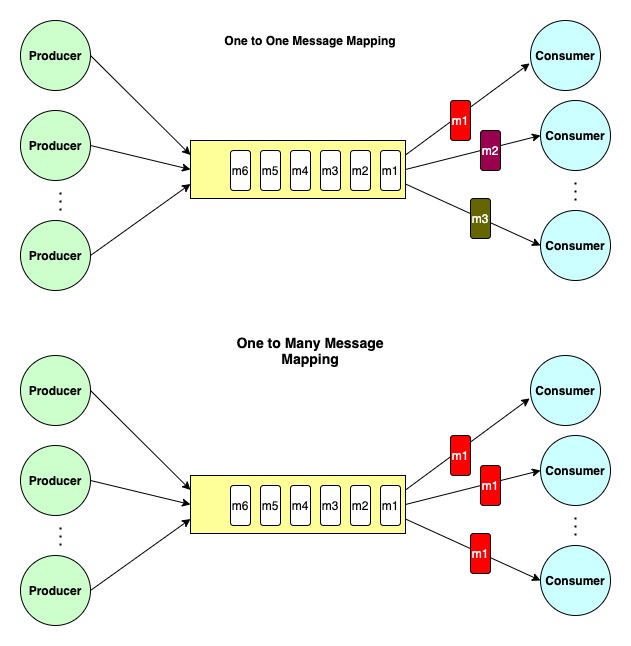Rqueue supports two types of message handling
- Unicast: One message is handed over to one the listener/handler/consumer
- Multicast: One message is handed over to multiple listeners/handlers/consumers
Message Multicasting
When multiple listeners are attached to the same queue, it’s essential to designate one as the primary listener. This primary listener handles retries and other operations related to message processing. Secondary listeners are invoked alongside the primary listener whenever a message is received. For example, if three listeners (L1, L2, and L3) are registered for the user-queue, one of them must be designated as primary.
Designating a primary listener means that if the primary listener (L2, in this example) encounters a processing failure, it retries the message. During retries, all listeners (L1, L3, and L2) might be called again with the same message (UserEvent1), potentially leading to duplicate processing for some listeners (L1 and L3), even if they successfully processed the event initially.
Configuration
Add RqueueListener annotation to any class, and use any of the spring stereotype annotation, so that a bean would be created. Annotate all listener methods in this class using RqueueHandler
@RqueueListener(value = "${user.banned.queue.name}", active = "${user.banned.queue.active}")
@Slf4j
@Component
@RequiredArgsConstructor
public class UserBannedMessageListener {
@NonNull
private final ConsumedMessageStore consumedMessageStore;
@Value("${user.banned.queue.name}")
private String userBannedQueue;
@RqueueHandler
public void handleMessage1(UserBanned userBanned) throws JsonProcessingException {
consumedMessageStore.save(userBanned, "handleMessage1", userBannedQueue);
log.info("handleMessage1 {}", userBanned);
}
@RqueueHandler
public void handleMessage2(UserBanned userBanned) throws JsonProcessingException {
consumedMessageStore.save(userBanned, "handleMessage2", userBannedQueue);
log.info("handleMessage2 {}", userBanned);
}
@RqueueHandler(primary = true)
public void handleMessagePrimary(UserBanned userBanned) throws JsonProcessingException {
consumedMessageStore.save(userBanned, "handleMessagePrimary", userBannedQueue);
log.info("handleMessagePrimary {}", userBanned);
}
@RqueueHandler
public void handleUserBanned(UserBanned userBanned) throws JsonProcessingException {
consumedMessageStore.save(userBanned, "handleUserBanned", userBannedQueue);
log.info("handleUserBanned {}", userBanned);
}
}
Limitation
Middleware: Middlewares are invoked globally before any handler method is called. They are not called individually for each handler. It’s crucial that message release is only handled by the primary handler to avoid inconsistent states.
Failure/Retry: Failure and retry mechanisms apply exclusively to the primary handler. If the primary handler fails during execution, all handlers will be retried in the subsequent attempt.
Metrics/Job data: Metrics and job data are recorded once per execution cycle. For instance, even if there are multiple handlers configured, such as four in this example, it will count as a single execution generating a single job record.
